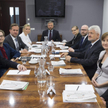Closed-loop economy cannot be separated from other phenomena that give hope for a better global tomorrow. AI, big data, blockchain, the already mentioned circular economy and other seemingly different areas have a common denominator – they set the directions of thinking for future years, creating a new economy.
But in order for ideas to become a reality, they require a huge effort, a change of thinking and sensitivity on many levels. Education, business design, good practices of dialogue between market participants need reflection and going beyond schemes. Excessive focus on vision or belief in the driving force of incidental implementations can reduce an opportunity for a genuine change to salon anecdotes.
We need a new way of thinking
The way of thinking determines the course of action. We are taught to reproduce patterns that help us organize our lives. In the case of circular economy, however, we are not dealing with a simple innovation and a change of this pattern. After all, we won’t immediately agree that we will start using what is created and what remains from production more wisely. Companies have not developed standards for discussing technology in a safe way, and effective implementation of circular economy will require not only cooperation between specialized companies, but also a serious intersectoral exchange of information.
Effective development of new ways of proceeding will certainly not take place without the participation of the legislator and the world of science. Therefore, taking advantage of the opportunity we face requires going beyond task-based thinking, e.g. concerning challenges related to the new specification of the enterprise offer resulting from the change of components or the necessary regulatory adaptations, taking into account the new mechanisms.
The world will not become better, cheaper and healthier than it is now; there are too many barriers. However, the fundamental obstacle lies within us. Since childhood, we have been shaped by the imperative of disposing of waste, considered as side products of our functioning. From the very first years we are taught that when we eat or play, we leave behind something dirty, bad, something to get rid of and forget about if we do not use it anymore. Such thinking is perpetuated at school, at university and at work. This translates into the whole economy and its functioning at all levels.





















